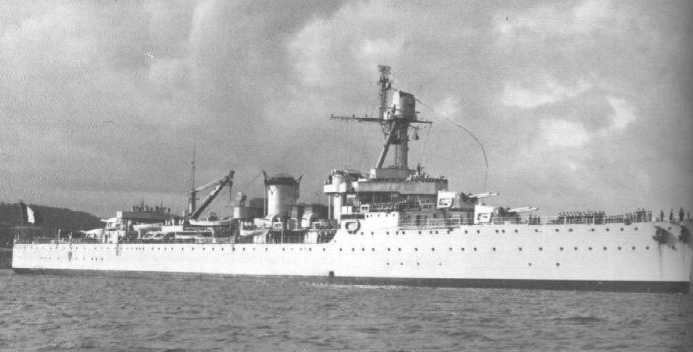|
Developed from Army guns of the same caliber. Built with an autofretted A tube, liner, jacket in two lengths and breech ring. Used a Welin breech mechanism which opened upwards. |

Light Cruiser Duguay-Trouin |
| .
|
|
Developed from Army guns of the same caliber. Built with an autofretted A tube, liner, jacket in two lengths and breech ring. Used a Welin breech mechanism which opened upwards. |

Light Cruiser Duguay-Trouin |
| .
|
| Designation | 155 mm/50 (6.1") Model 1920 |
| Ship Class Used On | Duguay-Trouin, Jean d'Arc and Bearn classes |
| Date Of Design | 1920 |
| Date In Service | 1926 |
| Gun Weight | 8.73 tons (8.87 mt) |
| Gun Length oa | 316.9 in (8.050 m) |
| Bore Length | 305.1 in (7.750 m) |
| Rifling Length | 250.5 in (6.362 m) |
| Grooves | (about 46) about 0.059 in deep x 0.295 in (1.5 mm x 7.5 mm) |
| Lands | about 0.120 in (3 mm) |
| Twist | Uniform RH 1 in 22.35 |
| Chamber Volume | 2,238 in3 (36.67 dm3) |
| Rate Of Fire
(see Note) |
3-5 rounds per minute |
| Note: The expected rate of fire for the light cruisers was six rounds per minute, but three rounds per minute was the usual rate of fire. The Permanent Trials Board criticized the complicated ammunition supply system. | |
| Type | Bag |
| Projectile Types and Weights | SAP - 124.6 lbs. (56.5 kg)
HE, internal nose fuze - 130.1 lbs. (59.0 kg) HE, base fuze - 124.6 lbs. (56.5 kg) Illum - N/A |
| Bursting Charge | SAP - about 6.5 lbs. (2.9 kg)
HE, internal nose fuze - 12.4 lbs. (5.6 kg) picric acid HE, base fuze (original) - about 7.4 lbs. (3.3 kg) picric acid HE, base fuze (later) - about 6.5 lbs (2.9 kg) cast TNT |
| Projectile Length | SAP - 31.5 in (80 cm)
HE - about 30.5 in (77.5 cm) |
| Propellant Charge | 43.67 lbs. (19.81 kg) BM11 |
| Muzzle Velocity | New gun with SAP: 2,854 fps (870
mps)
New gun with HE, base fuze: 2,835 fps (864 mps) Average gun: 2,789 fps (850 mps) |
| Working Pressure | about 19.4 tons/in2 (3,050 kg/cm2) |
| Approximate Barrel Life | about 700 rounds |
| Ammunition stowage per gun
(see Note 2) |
Duguay-Trouin: 125 rounds
Jean d'Arc: 150 rounds Bearn: N/A |
| Notes:
1) The propellant charge was in halves and was rectangular in shape. 2) Duguay-Trouin outfit was 1,000 HE, 60 illumination for upper turrets, no illumination for lower turrets, 40 practice rounds for upper turrets and 120 practice rounds for lower turrets. |
|
| Elevation | With 124.6 lbs. (56.5 kg) SAP Shell |
| Range @ 5 degrees | 9,400 yards (8,600 m) |
| Range @ 10 degrees | 14,220 yards (13,000 m) |
| Range @ 30 degrees | 24,060 yards (22,000 m) |
| Range @ 40 degrees | 27,340 yards (25,000 m) |
| Elevation | With 124.6 lbs. (56.5 kg) HE Shell |
| Range @ 40 degrees | 28,543 yards (26,100 m) |
| Designation
(see Note 3) |
Single Mounts
Bearn (8): N/A Two-gun Turrets
|
| Weight | Single Mount: N/A
Twin Mount: about 78.7 tons (80 mt) |
| Elevation | -5 / +40 degrees |
| Elevation Rate | about 6 degrees per second |
| Train | Model 1921: -140 / +140 degrees
Others: N/A |
| Train Rate | 6.4 degrees per second |
| Gun recoil | Nominal: 19.7 in (50 cm)
Maximum: 21.7 in (55 cm) |
| Notes:
1) Training and elevation for the two-gun turrets were electrically powered. The design of these were basically scaled-down versions of the earlier twin battleship turrets with twin dredger cage hoists running from the magazine and ammunition spaces up to a rotating working chamber. From here the ammunition was transferred into upper cage hoists which came up on the outside of each gun. Shells and charges were then manually transferred to loading trays and rammed by power. RPC for training was slated to be added to these but cancelled upon France's surrender in 1940. The gunhouses were gas tight with forced ventilation. "French Cruisers: 1922 - 1956" says that the guns proved unreliable and experienced "regular breakdowns" throughout their service lives. 2) The gun axes were 59 in (150 cm) apart. 3) The turrets on Jean d'Arc were larger and roomier so as to fit her role as a training ship. |
|
24 March 2007 - Benchmark
14 August 2010 - Added additional projectile
weights and burster weights
28 March 2012 - Updated to latest template
29 March 2013 - Added information about
twin turret mountings